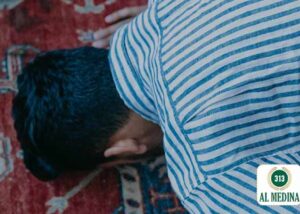Does bleeding break Wudu in the Shafi’i School?
Quran
Hadith
Islamic Text
No, bleeding does not generally break Wudu.
Praise be to Allah, and His Salutations and Peace be upon our Master Muhammad ﷺ, his believers and his Companions:
The Shafi’i school does not consider bleeding to invalidate wudu’ unless the bleeding occurs by exiting one of the two passages, namely the urethra or anal sphincter. If blood exits from either one of these two passages and in the case of a woman is not menstrual or post-natal blood, then it will invalidate the wudu’. Otherwise, bleeding does not break one’s wudu’ in the Shafi’i school. This ruling is not exclusive to bleeding; rather, this is the general ruling in the Shafi’i school where anything that exits one of the two passages will invalidate wudu’.
The invalidators of wudu’ are limited to four which should be found in any foundational text in the Shafi’i school. Imam an-Nawawi (d. 676), may Allah have mercy on him, says in al-Majmu’:
وَمَذْهَبُنَا أَنَّهُ لَا ينتقض الوضوء بخروج شئ من غير السبيلين كدم الفصد والحجامة والقئ وَالرُّعَافِ سَوَاءٌ قَلَّ ذَلِكَ أَوْ كَثُرَ
“The position of our school is that nothing that exits the body will invalidate wudu’, unless it exits from the two passages, such as blood from cupping, vomit, nose bleed regardless of the amount.”
This is supported by the narration of Jabir b. ‘Abd-Allah, may Allah be pleased with him, which is reported by Abu Dawud (Hadith no. 198) and its chain is classified as Hasan by Imam an-Nawawi, may Allah have mercy on him:
خرَجنا معَ رسولِ اللَّهِ صلَّى اللَّهُ عليهِ وسلَّمَ – يَعني في غزوةِ ذاتِ الرِّقاعِ – فأَصابَ رجلٌ امرأةَ رجلٍ منَ المشرِكينَ ، فحلَفَ أن لا أنتَهيَ حتَّى أُهَريقَ دمًا في أَصحابِ محمَّدٍ ، فَخرجَ يتبعُ أثرَ النَّبيِّ صلَّى اللَّهُ عليهِ وسلَّمَ ، فنزَلَ النَّبيُّ صلَّى اللَّهُ عليهِ وسلَّمَ منزلًا ، فقالَ : مَن رجُلٌ يَكْلؤُنا ؟ فانتَدبَ رجلٌ منَ المُهاجرينَ ورجُلٌ منَ الأنصارِ ، فقالَ : كونا بفَمِ الشِّعبِ ، قالَ : فَلمَّا خرجَ الرَّجُلانِ إلى فَمِ الشِّعبِ اضطجعَ المُهاجريُّ ، وقامَ الأنصاريُّ يصلِّي ، وأتى الرَّجلُ فلمَّا رأى شخصَهُ عرفَ أنَّهُ ربيئةٌ للقومِ ، فرماهُ بسَهْمٍ فوضعَهُ فيهِ فنزعَهُ ، حتَّى رماهُ بثَلاثةِ أسهمٍ ، ثمَّ رَكَعَ وسجدَ ، ثمَّ انتبَهَ صاحبُهُ ، فلمَّا عرفَ أنَّهُم قد نذَروا بِهِ هربَ ، ولمَّا رأى المُهاجِريُّ ما بالأنصاريِّ منَ الدَّمِ ، قالَ : سُبحانَ اللَّهِ ألا أنبَهْتَني أوَّلَ ما رمى ، قالَ : كنتَ في سورةٍ أقرَؤُها فلَم أحبَّ أن أقطعَها
“We proceeded in the company of the Messenger of Allah ﷺ for the battle of Dhat ar-Riqa. One of the Muslims killed the wife of one of the unbelievers. He (the husband of the woman killed) took an oath saying: I shall not rest until I kill one of the companions of Muhammad.
He went out following the footsteps of the Prophet ﷺ. The Prophet ﷺ encamped at a certain place. He said: Who will keep a watch on us? A person from the Muhajirun (Emigrants) and another from the Ansar (Helpers) responded. He said: Go to the mouth of the mountain-pass. When they went to the mouth of the mountain-pass the man from the Muhajirun lay down while the man from the Ansar stood praying.
The man (enemy) came to them. When he saw the person, he realised that he was the watchman of the Muslims. He shot him with an arrow and hit the target. But he (took the arrow out and) threw it away. He (the enemy) then shot three arrows. Then he (the Muslim) bowed and prostrated and awoke his companion. When he (the enemy) perceived that they (the Muslims) had become aware of his presence, he ran away.
When the man from the Muhajirun saw the (man from the Ansar) bleeding, he asked him: Glory be to Allah! Why did you not wake me up the first time when he shot at you.
He replied: I was busy reciting a chapter of the Qur’an. I did not like to leave it.”
Imam an-Nawawi (d.676), may Allah have mercy on him, in al-Majmu’ comments on this tradition by stating that this individual was bleeding profusely but he remained in prayer which indicates that bleeding alone does not invalidate wudu’ otherwise he would not have been able to continue the prayer and bow and prostrate as this cannot be done if the person is not in wudu’. Imam an-Nawawi, may Allah have mercy on him, continues to state the Prophet ﷺ was also aware of what had occurred and he ﷺ did not rebuke or offer correction to the individual’s actions.
And Allah knows best.
– Answered by Shaykh Mohammed Jamili, Jeddah, 21st Dhul-Hijjah 1442 (31.07.2021)






